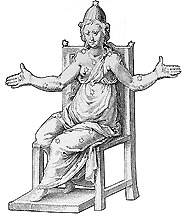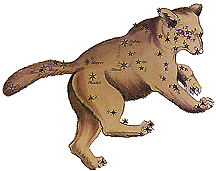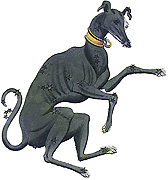
Star Art - An Introduction to Myths of Different Cultures
Star watching has occupied humans from the earliest times. Our ancestors studied the night sky and saw shapes and patterns among the stars. They often made up stories to explain what they saw. The same star constellation was seen very differently by people from different countries, or even different parts of the same country. When looking at the constellation Capricornus, for example, the ancient Aztecs saw Cipactli, the Whale. In India, Makaram, an antelope, was seen in the same constellation. The Assyrians thought the constellation looked more like a goat-fish, while the ancient Greeks thought it appeared to be a gate for the Gods to pass through. Below you will find a sample of constellation myths from different cultures: a Shawnee Indian myth, a Greek myth, a Woodland Indian myth, and an East Indian myth.
1. A Shawnee Indian Myth
A group of young sisters happily danced in a circle in the sky. They were seen from Earth by a brave and magical hunter named White Hawk, who wished to have one of them for his wife. White Hawk disguised himself as a field mouse, went to the heavens, and crept close to the dancing sisters. He decided on the youngest one, whom he grabbed and took away. White Hawk was very kind to the young girl and she quickly fell in love with him. Though she was happy with her husband, the youngest sister still wished to dance in the sky with her sisters. White Hawk gave her a magical white hawk's feather that allowed her to travel in a silver basket between Earth and the sky. Viewers from Earth always see a gap in the star circle. This is the place reserved for the youngest sister; it can be filled only when she travels to the sky to join the dance.
2. A Greek Myth

Cassiopeia, a queen of ancient Ethiopia, was a very beautiful woman. Unfortunately, she was also very vain and spent much of her time bragging about her beauty. She even boasted that she was far more beautiful than the maidens who attended Poseidon, the god of the sea, in his underwater kingdom. When Poseidon's maidens learned of this, they were very angry indeed. The maidens demanded that Poseidon punish Cassiopeia for daring to compare herself to them. Poseidon agreed that Cassiopeia should be punished. He placed her in the heavens to be scorned, not honored. Cassiopeia swings every half night around the North Star. She is seated in a chair, but the chair is placed upside down. Cassiopeia must hang on with both hands to keep from falling out. Her sky position is most humiliating for one who was so proud of her beauty.
3. A Woodland Indian Myth

Late in the spring, a bear awakened from its long winter sleep and wandered out of its hillside den in search of food. Soon three hunters spotted the bear and began to chase it. Just like the bear, the hunters were hungry after the long, cold winter. The first hunter carried a bow and arrow with which he hoped to kill the bear. The second hunter carried a big pot in which he hoped to cook the bear. The third hunter came behind the others. He was collecting wood for the huge fire which would be needed to cook such a large meal. All summer, the hunters chased the bear through the sky. In the fall, the bear started to get weak and the first hunter was able to shoot it with an arrow. The arrow killed the bear and it fell over on its back. The hunters ate the bear and left its skeleton behind. As fall turned to winter, the weather became colder and colder. The bear's skeleton was still visible in the sky, but the life spirit of the bear had entered a new body -- the body of another sleeping bear. All through the winter, the bear slept. When spring came again, the bear awakened and went out in search of food. Once again, it was hunted and killed. Its life spirit entered the body of yet another sleeping bear in the den. And so it happens every year.
4. An East Indian Myth

Long ago in India, there were five princes who left their kingdom to search for the kingdom of heaven. They took food and drink for their journey, and Prince Yudistira brought his dog, Svana. Yudistira was the eldest. His brothers were Sahadeva, the all-wise, who was learned beyond all men; Nakula, the all-handsome, famed for his grace and beauty; Arjuna, the all-powerful, who had never been defeated in any contest of arms; and Bhima, the all-joyful, known for his good humor and love of pleasure. After many days' journey, the brothers came to a fair where music was playing and people were feasting and dancing. Bhima, the all-joyful said to his brothers, "I will rest here today and be happy and seek the kingdom of heaven tomorrow." Yudistira, his brothers, and the dog
Svana went on without him. Several days later, the travelers arrived at a large plain where a great army was drawn up in ranks facing the enemy. When Arjuna, the all-powerful, saw this, he said to his brothers, "I will fight for my country today and seek the kingdom of heaven tomorrow."
Yudistira, his brothers, and the dog Svana continued without him. Many days and nights passed. The travelers came to a magnificent palace surrounded by a garden full of flowers and fountains. In this garden, a beautiful princess was walking with her attendants. When she saw Nakula, the all-handsome, she was seized with love and longing. Nakula, too, was struck with love. He said to his brothers, "I will stay with the princess today and seek the kingdom of heaven tomorrow." Nakula went into the garden and Yudistira, his brother Sahadeva, and the dog Svana continued without him.
Many weary days and nights later, the travelers came to a great temple where the holy men lived. Sahadeva, the all-wise desired to join them in prayer and study. He told his brother Yudistira, " I will stay here today and seek the kingdom of heaven tomorrow." Sahadeva went into the temple, and Yudistira and Svana continued without him. At last, Yudistira reached Mount Meru, the doorway to heaven. Indra, the Lord of Past and Present, appeared before him and invited him to ascend. Yudistira bowed low and replied, "Very willingly I will do so if I may bring my dog, Svana. "That may not be," said Indra. "There is no place in heaven for dogs. Leave him and enter into eternal happiness."
"I cannot do that," said Yudistira. "I do not wish for any happiness for which I must leave so dear a companion."
"You traveled on without your four brothers," said Indra. "Why will you not ascend to heaven without your dog?"
"My lord," replied Yudistira, "my brothers left me to follow the desires of their hearts. Svana has given his heart to me. Rather than renounce him, I must renounce heaven."
"You have spoken well," said Indra. "Come in, and bring your dog with you." So Yudistira and Svana ascended into paradise. In recognition of their devotion to one another, Indra set in the sky the constellation of the Great Dog whose star Sirius is the brightest of them all.